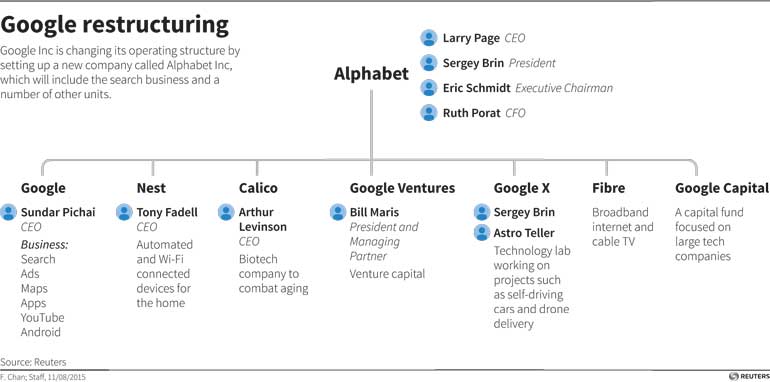Tuesday Feb 17, 2026
Tuesday Feb 17, 2026
Wednesday, 12 August 2015 00:00 - - {{hitsCtrl.values.hits}}

Reuters: Google Inc made clear in its announcement on Monday that in creating a parent company called Alphabet Inc, it was not intending to build products and brands under that name.
If it did, the company, which is no stranger to disputes over intellectual property, might have to contend with legal fallout for potentially trampling on the trademark rights of what is a fairly common brand among American businesses.
In addition to the hundreds of small businesses with Alphabet in their names, there are currently 103 trademark registrations in the United States that include the word “alphabet” or some close variation, according to a database search of the U.S. Patent and Trademark Office.
The registrations include computer games, clothing labels, furniture, toys, all manner of children’s books, as well as Alphabet Vodka and the Alphabet City Brewing Co in New York City. There is also the ever-familiar Alpha-Bits breakfast cereal.
Most of these brands have little to do with Google’s newer ventures to be housed under the Alphabet umbrella, including its divisions working on smart contact lenses and driverless cars.
However, there could be conflicts. For instance, calling the car division Alphabet could pose a problem given that it is already the name of the fleet management division of BMW Group, which owns the domain name alphabet.com. In order to prove trademark infringement, a trademark owner would have to show that the new Alphabet created a “likelihood of confusion” among consumers between the two brands. This could occur if both brands offered similar goods and services.
But in making the announcement, Larry Page, a Google co-founder and CEO of the new Alphabet, said: “(W)e are not intending for this to be a big consumer brand with related products - the whole point is that Alphabet companies should have independence and develop their own brands.”
The name was chosen, Page said, because the alphabet represents language, one of humanity’s most important innovations, and is the “core of how we index” in a Google Internet search.
A representative for Google did not respond to a request for comment.
Google has a lot of experience with legal troubles over intellectual property. The world’s largest Internet search provider is a frequent target by companies claiming it is violating their patents.
The company is also locked in a copyright battle with Oracle Corp over royalties for the use of the Java programming language, which is incorporated into Google’s Android operating system for smartphones.